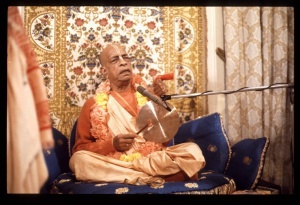CC Adi 15.22 (1975): Difference between revisions
(Vanibot #0027: CCMirror - Mirror CC's 1996 edition to form a basis for 1975) |
(Vanibot #0020: VersionCompareLinker - added a link to the Version Compare feature) |
||
| Line 2: | Line 2: | ||
<div style="float:left">'''[[Sri Caitanya-caritamrta (1975)|Śrī Caitanya-caritāmṛta (1975)]] - [[CC Adi (1975)|Ādi-līlā]] - [[CC Adi 15 (1975)|Chapter 15: The Lord's Paugaṇḍa-līlā]]'''</div> | <div style="float:left">'''[[Sri Caitanya-caritamrta (1975)|Śrī Caitanya-caritāmṛta (1975)]] - [[CC Adi (1975)|Ādi-līlā]] - [[CC Adi 15 (1975)|Chapter 15: The Lord's Paugaṇḍa-līlā]]'''</div> | ||
<div style="float:right">[[File:Go-previous.png|link=CC Adi 15.21 (1975)|Ādi-līlā 15.21]] '''[[CC Adi 15.21 (1975)|Ādi-līlā 15.21]] - [[CC Adi 15.23 (1975)|Ādi-līlā 15.23]]''' [[File:Go-next.png|link=CC Adi 15.23 (1975)|Ādi-līlā 15.23]]</div> | <div style="float:right">[[File:Go-previous.png|link=CC Adi 15.21 (1975)|Ādi-līlā 15.21]] '''[[CC Adi 15.21 (1975)|Ādi-līlā 15.21]] - [[CC Adi 15.23 (1975)|Ādi-līlā 15.23]]''' [[File:Go-next.png|link=CC Adi 15.23 (1975)|Ādi-līlā 15.23]]</div> | ||
{{CompareVersions|CC|Adi 15.22|CC 1975|CC 1996}} | |||
{{RandomImage}} | {{RandomImage}} | ||
==== TEXT 22 ==== | ==== TEXT 22 ==== | ||
| Line 11: | Line 10: | ||
<div class="verse"> | <div class="verse"> | ||
:ei mata nānā līlā kare gaurahari | :ei mata nānā līlā kare gaurahari | ||
:ki kāraṇe līlā, | :ki kāraṇe līlā,--ihā bujhite nā pāri | ||
</div> | </div> | ||
| Line 32: | Line 31: | ||
<div class="purport"> | <div class="purport"> | ||
The Supreme Personality of Godhead and His devotees who come to this world are executing a mission, and therefore sometimes they act in a way that is very difficult to understand. It is said, therefore, vaiṣṇavera kriyā-mudrā vijñeha nā bujhaya: | The Supreme Personality of Godhead and His devotees who come to this world are executing a mission, and therefore sometimes they act in a way that is very difficult to understand. It is said, therefore, vaiṣṇavera kriyā-mudrā vijñeha nā bujhaya: even if one is a very learned and intelligent scholar, he cannot understand the activities of a Vaiṣṇava. A Vaiṣṇava accepts anything favorable for executing his mission. But foolish persons, not knowing the purpose of such exalted Vaiṣṇavas, indulge in criticizing them. That is forbidden. Since no one can understand what a Vaiṣṇava does for the purpose of executing his mission, to criticize such a Vaiṣṇava is the offense called sādhu-nindā. | ||
</div> | </div> | ||
Latest revision as of 15:33, 26 January 2020

A.C. Bhaktivedanta Swami Prabhupada
TEXT 22
- ei mata nānā līlā kare gaurahari
- ki kāraṇe līlā,--ihā bujhite nā pāri
SYNONYMS
ei mata—in this way; nānā—various; līlā—pastimes; kare—does; gaurahari—Śrī Caitanya Mahāprabhu; ki kāraṇe—what is the reason; līlā—pastimes; ihā—this; bujhite—to understand; nā—not; pāri—I am able.
TRANSLATION
In this way Lord Caitanya Mahāprabhu performed various pastimes, but why He did so I cannot understand.
PURPORT
The Supreme Personality of Godhead and His devotees who come to this world are executing a mission, and therefore sometimes they act in a way that is very difficult to understand. It is said, therefore, vaiṣṇavera kriyā-mudrā vijñeha nā bujhaya: even if one is a very learned and intelligent scholar, he cannot understand the activities of a Vaiṣṇava. A Vaiṣṇava accepts anything favorable for executing his mission. But foolish persons, not knowing the purpose of such exalted Vaiṣṇavas, indulge in criticizing them. That is forbidden. Since no one can understand what a Vaiṣṇava does for the purpose of executing his mission, to criticize such a Vaiṣṇava is the offense called sādhu-nindā.